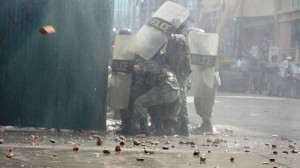This article originally appeared at Dissent Magazine.
Approximately 70 people sat outside the U.S. Embassy in Phnom Penh last week in the sweltering heat because, quite frankly, they had nowhere else to go. They were members of some 300 families who were forcibly evicted from their homes in Phnom Penh’s Borei Keila district on January 3. Their homes were bulldozed to make way for corporate development.
Urban poverty has remained a constant in Cambodia’s capital city since it was repopulated following the madness of the Khmer Rouge in the late 1970s. With little to no help from the ruling Cambodian People’s Party, many of the country’s poor have no alternative but to rely on philanthropic institutions and Western NGOs to meet their basic human needs. Indeed, the Cambodian government has often prioritized corporate investment, accompanied with the expected kickbacks for the political elite, above the needs of its citizens.
This was the case in the Borei Keila tragedy. The Cambodian League for the Promotion and Defense of Human Rights (LICADHO) provided a brief history of the situation in a recent press release that documents the government’s support for the construction company Phanimex, at the expense of the poor of Borei Keila:
In early 2003, a “land-sharing” arrangement was proposed for Borei Keila, which allowed the well-connected construction company, Phanimex, to develop part of the area for commercial purposes while providing housing to the residents on the remaining land. Phanimex was obligated to build 10 apartment buildings on two hectares of land for the villagers in return for obtaining ownership of an additional 2.6 hectares for commercial development.
–
In April 2010, Phanimex unilaterally reneged on the agreement, however—with the approval of the government—and only constructed eight buildings. That left 300 Borei Keila families excluded from the original agreement—and still living in housing on the site. These were the homes that Phanimex representatives destroyed today.

Cambodian police took a pounding before firing tear gas back at the displaced residents. Photo: Khmer440.com
Many of the homes were bulldozed before its inhabitants could gather their personal effects from inside. On January 4, things turned violent. Several villagers began throwing rocks at the various individuals participating in the destruction, including police officers, security guards, and Phanimex workers. Police responded by firing tear gas at the protesters. The Phnom Penh Post reported that ten people were injured and ten more arrested.
This is not the first time the residents of Borei Keila have faced discrimination from the government and Phanimex. On June 18, 2009, twenty HIV-affected families living in the community were evicted and sent to a remote resettlement camp fifteen miles away. This action was so egregious that it prompted Human Rights Watch to write a letter to Cambodian Prime Minister Hun Sen decrying the creation of a “de facto AIDS colony.” The families evicted were told they didn’t qualify for the free housing that Phanimex (falsely) promised it would build for displaced residents..
With little recourse from their own government, about seventy former inhabitants of Borei Keila decided to camp out in front of the U.S. Embassy last week, hoping to garner some international attention. The embassy, via its official Twitter page, issued a bland statement about the need to clarify property rights, and called for both sides to refrain from violence and to “exercise maximum restraint.”
It does not appear that the United States will do anything else. Since the Cambodian government has sided with Phanimex, the country’s civil society will likely have to provide for the families of Borei Keila, who are now, in effect, homeless, abandoned by their own government.